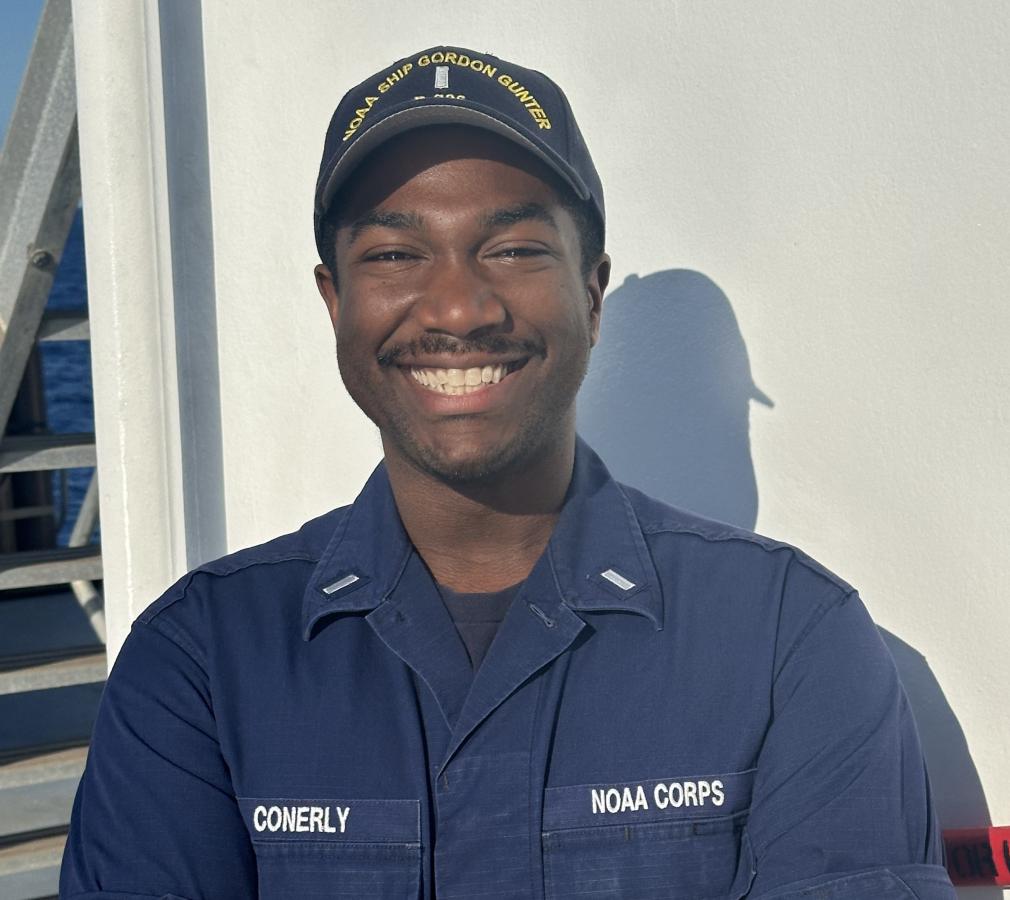
The NOAA Commissioned Officer Corps (NOAA Corps) is one of the nation’s eight uniformed services and NOAA Corps officers are an integral part of NOAA. With approximately 330 officers and growing, the NOAA Corps supports nearly all of NOAA’s programs and missions. The combination of commissioned service and scientific expertise makes these officers uniquely capable of leading some of NOAA’s most important initiatives. Meet NOAA Corps officer Lieutenant Junior Grade Carrington Conerly.
Where did you grow up?
I grew up in Washington, D.C., not far from Rock Creek Park. In 2009, my family moved to Doha, Qatar, where I lived for four years during high school.
Where did you go to school and in what subject did you get your degree(s)?
I attended The Ohio State University (OSU) and, in 2017, received my Bachelor of Science degree in environment and natural resources, specializing in water science. I then continued and earned my master’s degree in public administration from the John Glenn College of Public Affairs from OSU.
How did you hear about the NOAA Corps?
I knew about NOAA before the NOAA Corps. I thought the work that the civilian side did was incredibly interesting and right up my alley. Given my educational background, I knew I wanted to work in the environmental sector and for the government. In googling opportunities within NOAA, the NOAA Corps popped up. I distinctly remember that day as Lt. Cmdr. Pawlishen, the chief recruiter at the time, happened to be staffing a career fair at OSU that same day. I am not sure if I believe in fate, but the stars definitely aligned that Thursday.
What inspired you to become a NOAA Corps officer?
I have always had the utmost respect for individuals who serve our country. I often thought about joining another service, even exploring ROTC options in undergrad, however I could not find a branch that aligned with my passion for the environment. The NOAA Commissioned Officer Corps was the clear answer. Being able to facilitate research to better understand our world while being able to serve my country has been a blessing.
What advice would you give to someone who wants to be a NOAA Corps officer?
Apply! I did not think I would have been in this career field when I started college. There are so many different opportunities and resources that can shape your career into almost anything. Don’t be afraid to throw your hat in the ring. I had zero experience navigating ships, but you will learn the basics in Basic Officer Training Class and then apply what you have learned during your first sea tour. Another piece of advice is to reach out to current officers. Each officer’s career is different, so it is important to get a wide variety of experiences to know if the NOAA Corps is the right fit for you. Even if you only think you may be interested, focus on STEM (Science, Technology, Engineering and Mathematics) credits in college. We are a highly operational service that spends a lot of time interfacing with academics and researchers. Having a firm foundation in STEM is critical to the work we do.
As a NOAA Corps officer, how do you support environmental stewardship?
We are on the front lines of environmental research. The data that goes to Congress to shape policy or that goes back to universities to further our understanding, is collected at our level. It is my job to position the vessel so the science party can gather the best water samples they can. It is my job to announce when we are clear to deploy oceanographic buoys to meet our target site. It is my job to precisely control the ship to get close to whales without endangering them. It’s my job and I am proud to do it.
What operational moment sticks out to you the most and why?
It is hard to pick just one. I think I’d say the oceanographic buoy operations we did off the coast of Cabo Verde in the Atlantic. These buoys provide critical data for understanding our changing climate and have real impacts, not just for Americans, but for humanity as a whole. I believe that climate change is the greatest threat to our way of life and being able to say that I directly assisted in addressing this issue is a great legacy to leave.
What does Black History Month mean to you?
Black history month is a dedicated time to celebrate the accomplishments and culture of African Americans. When talking to my parents or even other black coworkers from older generations, it is amazing how much has changed in the past few decades. I think it is important to remember our collective history and to reflect on it but to continue to march forward and build a strong foundation for the next generations.

